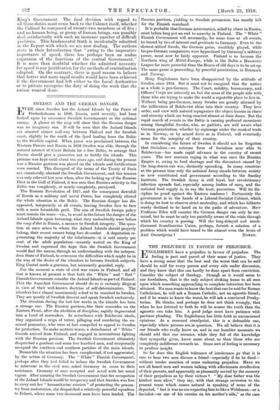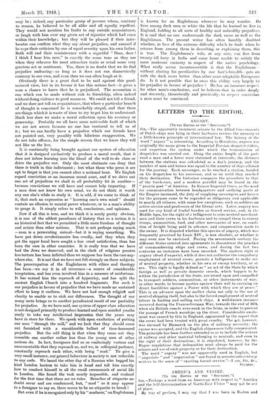THE PREJUDICE IN FAVOUR OF PREJUDICE.
ENGLISHMEN have a prejudice in favour of prejudice. The feeling is part and parcel of their sense of justice. They have a strong sense that the best and the worst that can be said should be said for every person and every side under discussion, and they know that this can hardly be done apart from conviction. Consider the subject of theology. Strange as it would seem to our forefathers, that is the only subject striking home to all men upon which something approaching to complete toleration has been attained. If a man wants to know the best that can be said for Roman Catholicism, he will ask a Roman Catholic, not an agnostic friend ; and if he wants to know the worst, he will ask a Convinced Presby- terian. He thinks, and perhaps he does not think wrongly, that when he has listened to both he will be nearer the truth than the agnostic can take him. A good judge must have patience with partisan pleading. The Englishman has little faith in unconcerned opinions. As a reasoned standpoint, this is a defensible one, especially where persons are,in question. We all believe that it is our friends who really know us, and in our humbler moments we should add that our enemies, while they fail of the knowledge that sympathy gives, know more about us than those who are completely indifferent towards us. Some sort of feeling is necessary to produce insight.
So far does this English tolerance of intolerance go that it is rare to hear two men discuss a friend—especially if he be dead— without tender mention of some endearing prejudice. Have we not all heard men and women talking with affectionate recollection of their parents, and apparently as pleasantly moved by the memory of their prejudices as by their virtues ? " My dear father was the kindest man alive," they say, with that strange reversion to the present tense which comes natural in speaking of some of the departed, " but it was no use expecting him to like a Welshman—or a Socialist—or one of his cousins on his mother's side," as the case may be ; indeed, any particular group of: persons whom, contrary to reason, he believed to be all alike and all equally repellent. They would not mention his faults to any outside acquaintance, or laugh with him over any given act of injustice which had come within their knowledge; but they will be pleased if their inter- locutor can confirm what they say about prejudice, and amused if he caps their criticism by one of equal severity upon his own father. Both will end their reminiscence with a regretful " Dear, dear ! I think I hear him now," in exactly the same tone as they use when they rehearse his most attractive traits or retail some very gracious act or sentiment. Yes, there is no doubt that we do find prejudice endearing—so long as it does not run diametrically contrary to our own, and even then we can often laugh at it.
Obviously there is a great deal to be said against this good- natured view, but in its favour it has this serious fact—it gives a man a chance to know that he is prejudiced. The accusation is one which can he made without risk to friendship, often indeed without doing violence to good manners. We could not tell a friend, and we dare not tell an acquaintance, that where a particular branch of thought is concerned be is remarkably stupid, and that there are things which it is waste of time to try to get him to understand. Much less dare we make a moral reflection upon his accuracy or generosity. Probably we all have some noticeable fault of which we are not aware because no one has ventured to tell us of it ; but we can hardly have a prejudice which our friends have not pointed out, very possibly with hilarious exaggeration. We do not take offence, for the simple reason that we know they will not like us the less.
It is continually being brought against our system of education that it is designed exclusively to produce a moral result, that it does not infuse learning into the blood of the well-to-do class or drive the prejudice out. Only the most obstinate can deny that there is truth in this indictment ; but what those who press it are apt to forget is that you cannot alter a national bent. We English regard conviction as an immense moral asset, and if we drive out one set of prejudices we shall in all probability let in another— because convictions we will have and cannot help imparting. If a man does not know his own mind, we do not think it worth any one else's while to study it. It is odd, if we come to think of it, that such an expression as " knowing one's own mind " should contain no allusion to mental power whatever, or to a man's ability to gauge it. It simply refers to will, conclusions, and opinions.
Now if all this is true, and we think it is surely pretty obvious, it is one of the oddest paradoxes of history that as a nation it is an historical fact that we permitted a little more freedom of thought and action than other nations. That is not perhaps saying much —man is a persecuting animal—but it is saying something. We have put down revolutionaries less cruelly, and they when they got the upper hand have sought a less cruel satisfaction, than has been the case in other countries. It is really true that we have had the Jews we deserved, and in the clash of religious passion less torture has been inflicted than we suppose has been the case any- where else. It is not that we have not felt strongly on these subjects. The preoccupation of the Englishman with ethics and theology has been—we say it in all reverence--a source of considerable temptation, and has even involved him in a measure of misfortune. It has earned him the reproach of hypocrisy, and has split the ancient English Church into a hundred fragments. For such is our prejudice in favour of prejudice that we have made no sustained effort to keep it uniform. We have not had enough religion and charity to enable us to sink our differences. The thought of our many sects brings us to another paradoxical result of our partiality for prejudice. As we have said, our system of upper-class education is not designed primarily to produce learned and open-minded youths ready to take any intellectual impression that the years may have in store for them. We speak with open exultation of putting our sons " through the mill," and we look that they should come out furnished with a considerable ballast of time-honoured
prejudice. But the odd thing is that when they come out they resemble one another rather less than the young men of other nations do. In fact, foreigners find us so confusingly various and
unaccountable that they reproach us, and we, in colloquial parlance, constantly reproach each other, with being " mad." To give a very small instance, our general behaviour in society is not reducible
to any code. We heard the other day of a Russian who begged his kind London hostess to take him in hand and tell him exactly how to conduct himself in all the small ceremonials of social life in London. She found the task nearly impossible, and realized for the first time that there are no rules. Breaches of etiquette no doubt occur and are condemned, but, " mad " as it may appear to a foreigner to say so, there seems to be no etiquette to break !
But even if he is recognized only by his " madness," an.Englishman
is known for an Englishman wherever he may wander. He lives among dark men or white the life that he learned to live ia England, holding to all sorts of healthy and unhealthy prejudices. It is said that no one understands the dark races so well as the Englishman. The present writer has often humbly doubted whether, in face of the extreme difficulty which he finds when he returns from among them in describing or explaining them, this is true. The Englishman's wife, at any rate, can live from twenty till forty in India and come home unable to satisfy the most moderate curiosity in respect of the native psychology. What really seems incontrovertible is that the Englishman— without abating his peculiarities by one hair's-breadth--gets oti with the dark races better than other more adaptable Europeans do. Is it not possible that he owes this ability very largely to his prejudice in favour of prejudice ? He has an immense respect for other men's conclusions, and he believes that in order deeply and sincerely, theoretically and practically, to respect conviction a man must be convinced.



































 Previous page
Previous page